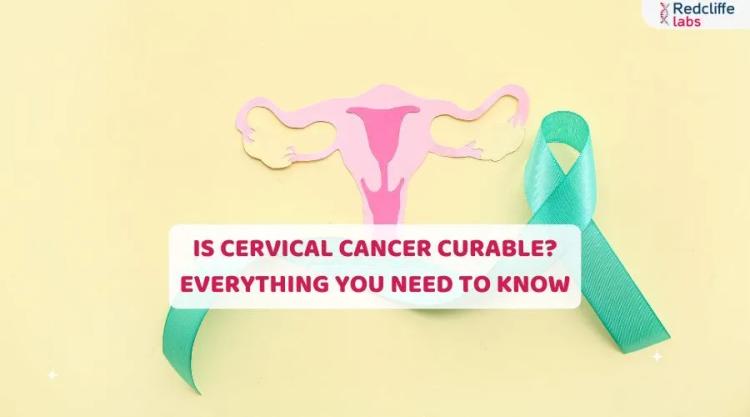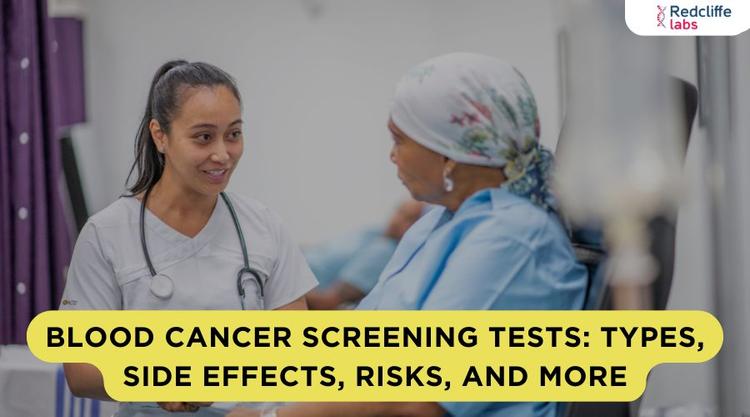Understanding Cervical Cancer: Risks, Prevention, and Treatment

Medically Reviewed By
Dr Divya Rohra
Written By Meenakshi
on Feb 3, 2024
Last Edit Made By Meenakshi
on Jan 7, 2025

Do you know about Cervical Cancer? Or have you heard the term for the first time today? Cervical Cancer is the second most common cancer among women in India. According to some studies, every 8 minutes, 1 woman loses their life to Cervical Cancer.
Still, the irony is that despite being a common and chronic cancer, around 58% of women had not heard of it before. Even with all the progress we have made in society so far, many women still feel uncomfortable talking about it, and we need to change that to put a pause on this day-by-day rising alarming figure. So, let’s understand all about it to manage it better.
What is Cervical Cancer?
Cervical Cancer is a Cancer that begins in the cells of the cervix and is primarily caused due to the human papillomavirus (HPV), a sexually transmitted infection. The thing about Cervical Cancer is that it usually progresses slowly and may not cause noticeable symptoms in its early stage.
Symptoms of Cervical Cancer
At the initial stage, cervical cancer may not cause any symptoms. However, the symptoms may appear as soon as it grows. You may experience:
- Vaginal bleeding (after intercourse, between periods, or after menopause)
- Heavy, long, and unusual menstrual bleeding
- Watery and bloody vaginal discharge
- Pain during intercourse
- Painful urination
- Blood in urine
- Unexplained weight loss
- Fatigue
- Loss of appetite
- Swelling in the legs and dull backache
- Pelvic pain
Seek medical help if you see these unexplained and unusual symptoms.
Who Should Take The Test For Cervical Cancer?
Few or no symptoms appear in the initial stage of cervical cancer. People associated with the below-listed factors are at risk of cervical cancer.
- People with an HPV infection.
- People who don’t take regular screening tests.
- People with a sexual history with one or more partner
- People indulge in smoking.
- People with an HIV infection
- People with a weak immune system
- People with family history
- People with diethylstilbestrol (DES)
Also, read https://redcliffelabs.com/myhealth/web-stories/7-early-signs-of-cancer-that-shouldnt-be-ignored/
Causes of Cervical Cancer
One of the major reasons for cervical cancer is Human Papillomavirus (HPV). HPV is a long-term infection, especially HPV 18 and HPV 16. These are two types that cause 70% of cervical cancers globally.
HPV is a sexually transmitted infection. Sexually active people are at a high risk of cervical cancer. HPV goes away within a couple of years and doesn’t cause cervical cancer. However, in some people, it can stay for a long and turn into cervical cancer. These factors are:
- Weak immune system
- Smoking or passive smoking
- Obesity
- Reproductive factors (contraceptives)
Types of Cervical Cancer
There are two major types of cervical cancer. These are squamous cell carcinomas and adenocarcinomas.
80 to 90% of people with cervical cancer are squamous cell carcinomas. These cells are thin and occur in the outer part of the cervix.
10 to 20% of people with cervical cancer are adenocarcinomas. They are column-shaped gland cells that appear in the cervical canal.
Stages of Cervical Cancer
There are four stages of cervical cancer. Your doctor is best to help with the diagnosis of stages of cervical cancer. Here is a layout of all the stages.
Stage I: It is the very beginning of cervical cancer. Cancer begins in the neck of the cervix. This is a curable stage, as cancer hasn’t affected deeper parts of cervical tissues.
Stage II: In the second stage, cancer spreads from the cervix and uterus but hasn't affected the pelvic wall or lower vagina.
Stage III: Cancer spreads in the lower part of the vagina, pelvic wall, uterus, and near lymph nodes.
Stage IV: Stage IV is a severe stage. The cancer spreads from the bladder to the lungs or bones.
Risk Factors for Cervical Cancer:
- HPV or Human Papillomavirus: Human Papillomavirus, a common virus that spreads during sexual intercourse, is the most common cause of all Cervical Cancers. HPV has different forms and can cause changes in your cervix, leading to Cervical Cancer over time.
- Excessive Smoking: Besides, if you have the habit of excessive smoking or tobacco, you could be at a higher risk of Cervical Cancer. Therefore, you have to be very careful of your choices.
- Weakened Immune System: A weakened or compromised immune system is another major cause that increases your risk for Cervical Cancer.
- Obesity: Lastly, being overweight is another risk factor associated with a high odds of developing Cervical Cancer.
Whether you are at risk or not, taking preventive measures or considering routine screening is always advisable, as it helps detect the formation of cancerous cells in the cervix even before the symptoms start to appear. So, what are the preventive measures that can help? Scroll down to learn more.
Complications Linked With Cervical Cancer
Potential complications of cervical cancer are:
- Kidney damage
- Bleeding
- Bladder or bowel movements
- Fertilities or pregnancy challenges
- Excessive pain
- Blood clot
- Fertility or pregnancy challenges
- Side effects of cancer treatment
- Excessive bleeding
How Long Can Cervical Cancer Go Unnoticed?
HPV infection stays for a couple of years and doesn't transfer into cervical cancer. However, in some people, it can turn into cervical cancer. Precancerous cells take around three to seven years to turn cancerous. Screening or pap tests may help in detecting the symptoms.
Redcliffe Labs offers cancer screening packages for males and females. The test can detect cancer symptoms and risks and help doctors diagnose, prevent, and treat cancer. Take women to the screening package to detect cancer symptoms.
Also, read https://redcliffelabs.com/myhealth/cancer/hpv-and-cervical-cancer-everything-you-need-to-know/
How to Diagnose Cervical Cancer?
Cervical cancer takes years to develop. The cells in your cervix change a lot before turning into cervical cancer. These normal cells turn from normal to abnormal. You might experience vaginal bleeding, pain during urination and intercourse, pelvic pain, or loss of appetite. If you see these signs, take a screening test. Screening tests can help in diagnosing an underlying infection. Redcliffe Labs offers an advanced and essential cancer screening package.
Cancer Screening Package Essential
Redcliffe Labs offers a cancer screening package that is essential for both males and females. The package includes three parameters to check cancer risks before its symptoms appear. The cancer screening package is vital for males with INR 1099. It helps in treating, preventing, and diagnosing cancer in males. After booking the screening essential package, their DMLT-certified phlebotomist will visit your home for sample collection. You will receive the test reports within 15 hours.
Cancer Screening Package Advance
The cancer screening package advance for females helps in measuring the health and symptoms of cancer in women and men even before the symptoms appear. Additionally, the advance package for males and females is for 1599, including 30 parameters. The screening package advance for males helps in early diagnosis and prevention. It will take a minute to book the advance package.
Preventive Measures To Reduce Your Risk For Cervical Cancer:
- Get Vaccinated: The first and foremost preventive measure that can effectively help you prevent preventable Cancer is vaccination. Cervical Cancer is also informally considered preventable Cancer because with routine diagnosis, prevention, and cure when at a very early stage is possible. And fortunately, HPV Vaccines are available, which effectively prevent it. It is recommended for young adults, especially before becoming sexually active.
- Get Yourself Regularly Screened: Moreover, Pap smears and HPV tests are common screening tests available that help with early detection of cervical Cancer. According to medical guidelines, one should start Cervical Cancer Screening at the age of 21 at regular intervals based on individual risk factors, medical history, and more such factors. It helps detect abnormalities (if any) even before the symptoms appear so you can identify the threat and take charge against it early.
- Embrace Lifestyle Changes: Smoking is one of the major risk factors making you more susceptible to Cervical Cancer. Therefore, keeping your distance from the habit or embracing other lifestyle changes like a healthy life, active routine, safe sex practices, and limiting sexual partners can minimize the likelihood of HPV transmission.
Cervical Cancer is a prevalent yet preventable form of Cancer, and with the right approach, it is possible to prevent it and save you from the worst. Cancer may not pose any noticeable symptoms at its early stage, making it harder for women or anyone to identify it; there comes the role of routine cervical screening. It allows for identifying abnormal changes in cervical cells before the Cancer develops or at an early stage when it is most treatable.
Early Detection Can Save Lives:
Remember, while Cervical Cancer can be chronic, it is also preventable and treatable if diagnosed and managed early. So, if you are a woman, don’t escape from the routine screening, as it can save your life. Encourage other women around you to get screened as soon as possible to identify their risk and take charge of their health.
Redcliffe Labs – Your Destination For All Preventive To Specialized Health Screening
Regarding reliable diagnostic experience, Redcliffe Labs is the most trusted diagnostic service provider you can reach. With years of diagnostic experience, a comprehensive range of tests, doorstep sample collection, and timely and accurate reports, Redcliffe Labs can be trusted to book the Human Papillomavirus (HPV) DNA Detector Test to screen the high-risk HPV types that cause cervical Cancer. We provide precise sample collection and timely delivery of reports so one can act on time.
Cervical Cancer can be serious if left unaddressed. So, stay informed, prioritize regular screening, and consult with healthcare professionals for personalized guidance and to avoid complications.



